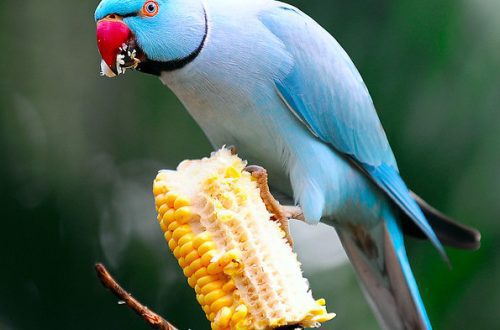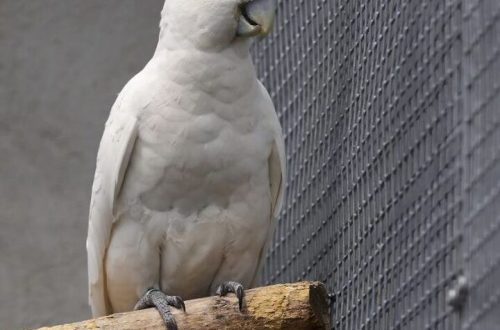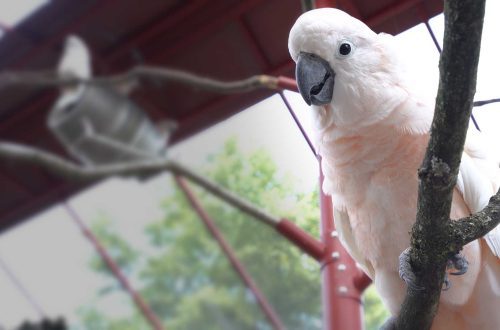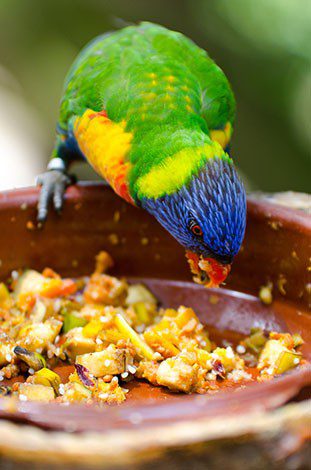
Fruits and vegetables for the parrot
Vegetables and fruits for the parrot not only tasty, but also bring undoubted benefits, so it is worth making them an indispensable part of the daily diet of our feathered friends.However, there are a number of rules that must be observed if you give fruits and vegetables to a parrot:
- Make sure your parrot fruits and vegetables are grown without the use of pesticides.
- Vegetables and fruits for a parrot are given only fresh.
- Wash them thoroughly with clean water.
- Vegetables and fruits for a parrot are either cut into pieces or grated.
- Vegetables can be given both separately and mixed with other products.
- The peel is removed from citrus fruits, and seeds are extracted from fruit crops (plum, cherry or apricot).
- Berries can be frozen in summer, and in winter they can be offered to a feathered friend defrosted.
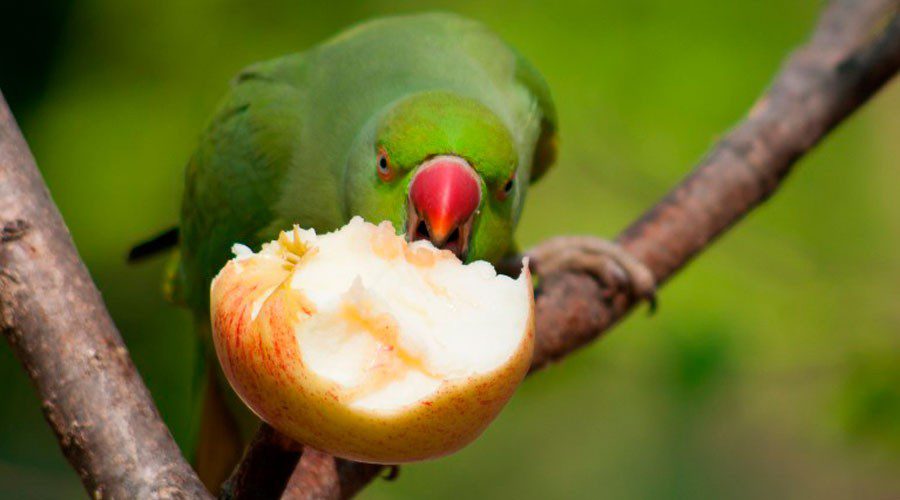

In the photo: fruits and vegetables for a parrot
Contents
What vegetables and fruits can be given to a parrot?
Very helpful apples They contain iron, minerals and vitamins.Pear – a valuable source of fiber, and there is practically no fat. And there are no less microelements and vitamins in it than in apples. citrus contains vitamin C. Tangerines are especially useful for parrots.
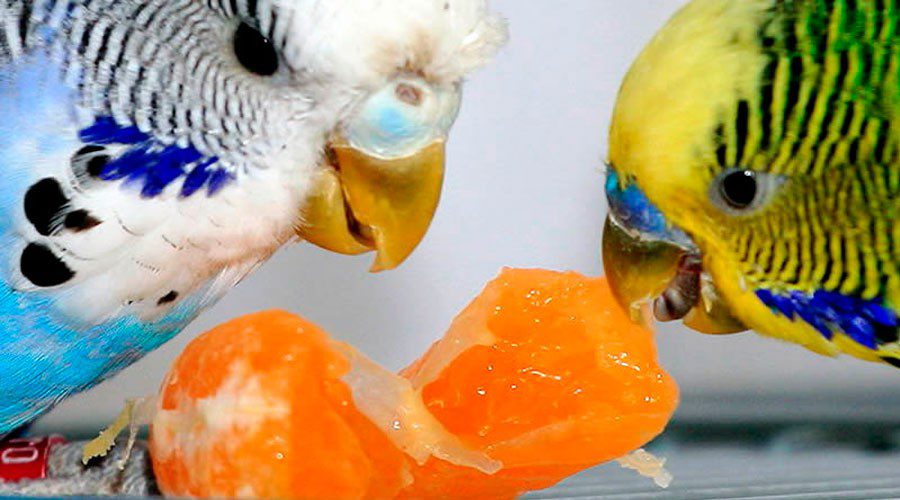



Grapes is a strong antioxidant, removes toxins from the bird’s body, it contains a lot of trace elements and vitamins. It is enough to give 3 – 5 grapes per week. Banana considered a source of starch and sugars, it is peeled and given in small pieces, as this product quickly deteriorates. apricots, merry, cherry и peachescontaining vitamins and minerals. Cherry, in addition, is a rich source of fructose. Parrots and berries love: raspberries, all kinds currants, sea buckthorn, berries, chokeberry and red rowan, strawberries, briar, strawberries, cowberry, blueberries, honeysuckle и cranberry. All this is useful fresh in the season, and dried or steamed in winter.Kiwi given without skin.Pineapple can act only as a treat, given a little bit. The pineapple must be ripe and fresh.Garnet contains many vitamins, microelements and sugars. A very valuable food is carrot, in which there is a lot of carotene and other useful substances. Carrots are “served” raw, grated or cut into pieces. You can give turnip, but it is not as useful as carrots. A storehouse of trace elements, vitamins and sugars are melon и pumpkin. Give them raw, pre-cut into pieces. Pumpkin seeds are also useful: they are a source of vitamins A, D, E, K and many trace elements. You can give them crushed. Sugar and fiber contain squash и squash.Watermelon does not have a very strong laxative effect. From this delicacy, a bird can “extract” sugars, fiber and some vitamins, but watermelon is not very nutritious. They give parrots both pulp and seeds. Trace elements and vitamin E are found in cucumber. In addition, thanks to cucumbers, the metabolism of birds improves. However, do not give purchased cucumbers, offer your pet only those grown in your garden and fresh. A good type of food is considered a tomato: it contains carotene, B vitamins, vitamin C and organic acids. And the seeds have a lot of vegetable oil. A parrot can only be given ripe fresh fruits. Green tomatoes can bring not benefit, but harm: they contain solanine (a poisonous alkaloid), which is destroyed when ripe. Make sure that “chemistry” was not used when growing these fruits. A lot of fiber, sugar, trace elements and vitamins are found in beetroot. A significant plus: it can be stored for a long time and used in the winter.
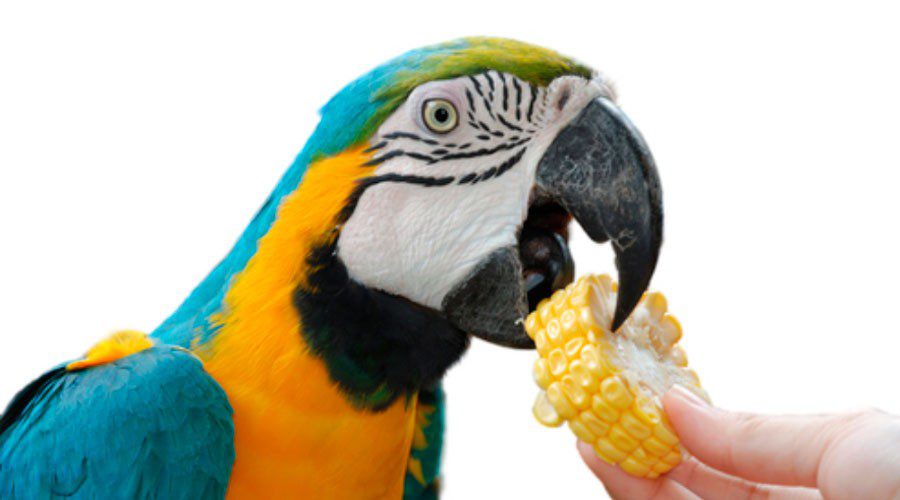



Corn give fresh, but only at the stage of milky ripeness, when the grains are sweet and soft. Corn is high in carbs and low in fiber. It contains more protein than other grain feeds. Also, corn contains starch and vitamin B. In the phase of milky ripeness, they are fed beans и green pea. They contain many vitamins and sugars. However, legumes are given a little bit and only in season. Excellent vitamin food – cabbage. It is rich in trace elements. The leaves are fed in slices, and the dense stalk is cut or grated. If you decide to give Beijing salad (Chinese cabbage), be careful: parrots are given only the green parts of the leaves. Petioles contain nitrates!Salad и spinach very useful, they have a lot of vitamins and minerals. However, give them little by little: a large amount of your pet may upset digestion. Be especially careful when introducing lettuce and spinach into the diet after a break. Fruits are rich in vitamin A, C, E, groups B, P and nutrients sweet bell pepper. In addition, it contains minerals (magnesium, potassium, calcium, sodium, iron, manganese, copper, iodine, zinc, fluorine, silicon), acids and carbohydrates. And there is more vitamin C than in a lemon! Pepper seeds are not extracted. Your feathered friend’s daily diet should include greenery. If you give grass, it should be freshly picked and washed with clean water. Leaves of trees and grass growing in the city should not be given – they accumulate a lot of harmful substances. You can give clover, woodlice, burdock, meadow grasses, vines, fresh and dry nettle leaves, quinoa, plantain, wheat, oats and other cereals.
What fruits and vegetables should not be given to a parrot?
- Celery It contains essential oils and has a spicy taste.
- Radish because of the spicy taste.
- Garlic, onion – in addition to taste, contain essential oils.
- Spicy and spicy vegetablesradish, daikon and others).
- Eggplant is a source of solanine (like green potato tubers).
- Persimmon, avocado, mango и papaya – they all contain harmful substances and are fraught with poisoning.
- Nuts – this is a nutritious and fatty food, they can be given only as a treat and not more than 2 times a month. Give a small piece of walnut, hazelnut or cashew or up to 2 shelled pine nuts.
- Fragrant and spicy herbs: dill, parsley, celery, hyssop, cilantro etc.





